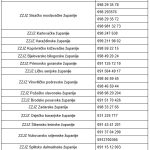Only 5.6 percent of those surveyed by the Zagreb-based research institute, Mediana Fides, said that the anti-epidemic measures introduced by the National Civil Protection Headquarters were too strict.
As Poslovni Dnevnik/Sergej Novosel Vuckovic writes on the 28th of March, 2020, although Croatia’s new restrictive measures to curb the spread of coronavirus have been proclaimed the most stringent in all of Europe, there are still many who seem to believe the measures aren’t strict enough.
Moreover, according to a survey by Mediana Fides, 46.5 percent of respondents say that Croatia should introduce even more measures, and 45.4 percent of the respondents stated that the current measures to combat the coronavirus epidemic are very much appropriate as they are. The market research firm Mediana Fides obtained these results from a survey conducted between March the 22nd and the 24th, 2020, among its 503 adult panelists from across the country, with them having paid due attention to the representativeness of the samples by gender, age and region.
As stated, only 5.6 percent of those who were asked said that the measures introduced by the National Civil Protection Headquarters were too strict. The basis of the Mediana Fides Institute’s survey focused on the ”severity” of the measures currently in place (there was also an earthquake in Zagreb to take into account).
When asked whether the respondents were properly adhering to the recommendations on staying at home consistently – 74 percent admitted that they were consistent, 24 percent said they could not be permanently at home due to work obligations, and 2 percent said they believed such measures were an exaggeration.
Regarding the fact that the situation forced many to have to work from home, we found out that more than half of those asked (52 percent of them) can’t work from home due to the nature of their job and that 38 percent of people can and do work from home. For 9 percent of them, their employer hasn’t even given this opportunity, and 1 percent of them cannot organise the necessary childcare.
“In conclusion, we asked respondents what they were most concerned about. Of those, 65 percent agreed on being most concerned with when the epidemic would end, and nearly half of those surveyed were also concerned about a sense of helplessness (45 percent), fear of infecting the at-risk/more vulnerable population (43 percent) and loss of income (43 percent),” Median Fides said.
Interestingly, only 19 percent of those surveyed were most concerned about the possibility of being fired, which is somewhat inconsistent with the situation on the ground, where tens of thousands of workers have already been laid off, mostly due to a fall in employer income due to an inability to carry out business operations normally.
Make sure to follow our dedicated section for rolling information and updates in English on coronavirus in Croatia.










